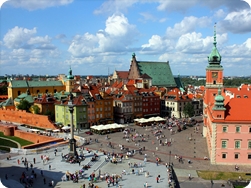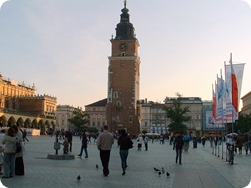4 June 1989
4 June 1989 - The day that changed Poland and Central and Eastern Europe.
As I sit here in my hotel room in Krynicy-Zdroj, Poland, on this historic day in the life of a nation I realise that none of my interest in this country would have happened if this event had not of taken place.
1988
In May and August 1988 there were massive waves of workers' strikes that broke out in the People’s Republic of Poland. The strikes, as well as street demonstrations, continued throughout spring and summer, ending in early September 1988. These actions shook the Communist regime of the country to such an extent, that it was forced to begin talking about recognising Solidarity, an #8220;unofficial” labour union that subsequently grew into a political movement.
As a result, later that year, the regime decided to negotiate with the opposition, which opened the way for the 1989 Round Table Agreement.The second, much bigger wave of strikes (August 1988) surprised both the Government, and the leaders of Solidarity, who were not expecting actions of such intensity. These strikes were mostly organized by local activists, who had no idea that their leaders from Warsaw had already started secret negotiations with the Communists.
April 1989
In the early months of 1989, as a result of the Round Table talks by the Communist Party and the Solidarity (Solidarność in Polish) movement an agreement was signed calling for partially free elections to the Parliament. The opposition was to have 35% of the seats in Sejm, and an entirely free election to Senate. The final agreement was signed on 4 April 1989.
As a result, real political power was to be vested in a newly created bicameral legislature (Sejm, with recreated Senate), and it also recreated the office of president who would be the chief executive. Solidarność became a legitimate and legal political party. On 7 April 1989 the existing parliament (Sejm) changed the election law and changed the constitution (through the April Novelization), and on 17 April, the Supreme Court of Poland re-registered Solidarity.
Soon after the agreement was signed, Solidarity leader Lech Wałęsa travelled to Rome to be received by the Polish Pope John Paul II.
A fully free election was promised in four years. All seats to the newly recreated Senate of Poland were to be elected democratically, as were 161 seats (35 percent of the total) in Sejm. The remaining 65% of the seats were reserved for the Communist Party (Polish United Workers' Party, PZPR) and its satellite parties (United People's Party, ZSL, Democratic Party, SD and communist-aligned tiny Catholic parties). In addition, all 35 seats elected via the country-wide list were reserved for the Party's candidates provided they gained a certain quota of support. This was to ensure that the most notable leaders of the Party were elected.
The outcome of the election was largely unpredictable, pre-electoral opinion polls: inconclusive. After all, Poland had not had a truly fair election since the 1920s, so there was little precedent to go by. The last contested elections were those of 1947, in the midst of communist-orchestrated violent oppression and electoral fraud.
This time, there would be open and relatively fair competition for many seats, both between communist and Solidarity candidates, and in some cases, between various communist candidates. While censorship was still in force, the opposition was allowed to campaign much more freely than before, with a new newspaper, Gazeta Wyborcza, and reactivation of Tygodnik Solidarność. Solidarity was also given access to televised media, being allocated 23% of electoral time on Polish Television.
In addition there was no restrictions on the financial support allowed. It was a known fact that the Communists were unpopular, but there were no reliable surveys as to how low support for them would actually fall. A rather flawed survey carried out in April, days after the Round Table Agreement was signed, suggested that over 60% of those surveyed wanted Solidarity to co-operate with the Government. Another survey a week later, regarding the Senate elections, showed that 48% of those surveyed supported the opposition, 14% the communist Government, and 38% said they were undecided. In such a situation, both sides faced another unfamiliar aspect, the electoral campaign itself.
The communists knew they were guaranteed 65% of the seats and expected a difficult but winnable contest; in fact they were concerned about a possibility of “winning too much”, as they desired some opposition, which would serve to legitimize their Government both on the home front and at international levels.
The communist Government still had control over most of the media and employed both sports and television celebrities as their candidates, as well as successful local personalities and business leaders.
Some of the political opposition were concerned that such tactics by the communists would gain enough votes from the less educated segment of the population, to give the communists the legitimacy that they craved. Only a few days before June 4 the party Central Committee was discussing the possible reaction of the western world should Solidarity not win a single seat. At the same time the Solidarity leaders were trying to prepare a set of rules for the non-party MPs in a communist-dominated parliament, as it was expected that the Solidarity would win not more than 20 seats. The leaders of Solidarity were also complaining that the way electoral districts were drawn up was not favourable towards it.
June 1989
The Polish legislative election of 1989 was the tenth election to the Sejm, the parliament of the People's Republic of Poland, and eleventh in Communist Poland. It took place on 4 June (first round) and 18 June (second round). The election held on 4 June 1989 brought a landslide victory to Solidarity. It was clear that the Communist Party would not be able to continue to govern in the face of such massive opposition from the people. Although the Parliament returned, dubbed the “contractual Parliament”, elected Gen. Jaruzelski President of the Republic, the office of Prime Minister was entrusted to a Solidarity candidate, Tadeusz Mazowiecki, who had been chief adviser to the Gdańsk strike committee in 1980.
Not all parliamentary seats were freely contested, but the resounding victory of the Solidarity opposition in the freely contested races paved the way to the fall of Communism in Poland. In the election's aftermath, Poland became the first country of the Eastern Bloc in which democratically elected representatives gained real power.
Although the elections were not entirely democratic, they paved the way for creation of Tadeusz Mazowiecki's cabinet and a peaceful transition to democracy, both in Poland and elsewhere in the Central and Eastern Europe, which was confirmed after the Polish parliamentary elections of 1991.
July 1989
On 29 July 1989 the Parliament changed the country’s name and constitution and The People’s Republic of Poland became a part of the nations history. So started the age of the third Republic of Poland. These historic events in Poland precipitated the fall of the entire Communist bloc.
The 4 June 1989 should also be remembered for another anniversary, the brutal crackdown by Chinese troops against protesters in Tiananmen Square, which resulted in hundreds being killed.




